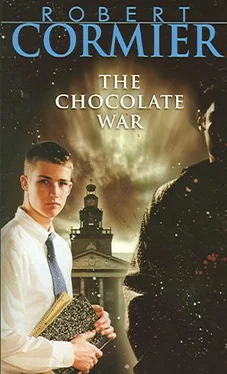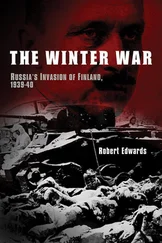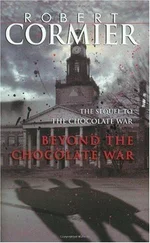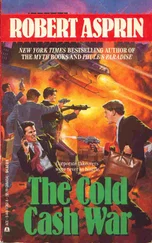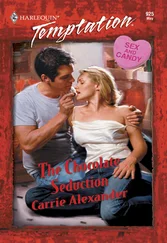The silence in the class was the kind Goober had never heard before. Stunned, eerie, suffocating.
"Santucci?" Leon called out, his voice strangled but struggling to be normal.
"Yes."
Leon looked up, smiling at Santucci, blinking away the flush on his cheeks, a smile like the kind an undertaker fixes on the face of a corpse.
"Tessier?"
"Yes."
"Williams?"
"Yes."
Williams was the last. There was no one in this class with a name beginning with X, Y, or Z. Williams' yes lingered on the air. No one seemed to be looking at anyone else.
"You may pick up your chocolates in the gym, gentlemen," Brother Leon said, his eyes bright — wet bright. "Those of you who are true sons of Trinity, that is. I pity anyone who is not." That terrible smile remained on his face. "Class dismissed," Leon called although the bell had not sounded.
Let's see, he knew he could count on his Aunt Agnes and Mike Terasigni whose lawn he cut every week in the summer, and Father O'Toole at the rectory (although his mother world massacre him if she knew he had Father O'Toole on the list) and Mr. and Mrs. Thornton who weren't Catholic but always willing to help a good cause, and, of course, Mrs. Mitchell the widow whose errands he did every Saturday morning and Henry Babineau the bachelor with his awful breath that almost knocked you down when you opened the door but who was pointed out by all the mothers in the neighborhood as the kindest, most gentlest of men…
John Sulkey liked to make out the lists whenever there was a sale at the school. Last year, as a junior, he had won first prize for selling the most chances in a school raffle — one hundred and twenty-five books, twelve tickets in each book — and received a special pin at the Awards Assembly at the end of the school year. The only honor he had ever won — purple and gold (the school colors), shaped like a triangle, symbolizing the trinity. His parents had beamed with pride. He was lousy at sports and a squeaker of studies — just barely squeaking by — but, like his mother said, you did your best and God took care of the rest. Of course, it took planning. That's why John made out his lists ahead of time. Sometimes he even visited his regular customers before a sale began to let them know what was coming. He liked nothing better than getting out there on the street and ringing the doorbells and seeing the money pile up, money he would turn in the next day at roll call, and how the Brother in the homeroom would smile down on him. He remembered with a glow when he went up to the stage for his award last year and how the Headmaster had talked about Service To The School, and how "John Sulkey exemplified these special attributes" (the exact words which still echoed in John's mind, especially when he saw those undistinguished rows of C 's and D 's on his report card every term). Anyway. Another sale. Chocolates. Double last year's price but John was confident. Brother Leon had promised to put up a special honor roll on the bulletin board in the main first-floor corridor for those who made their quota or exceeded it. A quota of fifty boxes. Higher than ever before, which made John happy. It would be harder for the other guys to meet the quota — already they were groaning and moaning — but John was supremely confident. In fact, when Brother Leon had told them about the special honor roll, John Sulkey could have sworn he was looking directly at him — as if Brother Leon was counting personally on him to set a good example.
So, let's see, the new housing development on Maple Terrace. Maybe he should make a special campaign in that neighborhood this year. There were nine or ten new homes there. But first of all, the old faithfuls, the people who had become regular customers: Mrs. Swanson who sometimes smelled of liquor but was always eager to buy anything although she kept him talking too long, rambling on about people John Sulkey didn't even know; and good old reliable Uncle Louie who was always simonizing his car although simonizing cars seemed part of the Dark Ages these days; and then the Capoletti's at the end of the street who always invited him in for something to eat, cold pizza that John wasn't exactly crazy about and the smell of garlic that almost knocked you down but you had to make sacrifices, big and small, for the sake of Service To The School…
* * *
"Adamo?"
"Four."
"Beauvais?"
"One."
Brother Leon paused and looked up.
"Beauvais, Beauvais. You can do better than that. Only one? Why, last year you set a record for the number of boxes sold in a week."
"I'm a slow starter," Beauvais said. He was a goodnatured kid, not exactly a whiz in his studies but likeable, without an enemy in the world. "Check me next week," he said.
The class laughed and the Brother joined in the laughter. The Goober laughed, too, grateful for the small relaxation of tension. He found that in recent days the kids in class had a tendency to laugh at things that weren't really funny, simply because they seemed to be looking for something to divert them for a few moments, to prolong the roll call, prolong it until the R 's were reached. Everyone knew what would happen when Renault's name came up. It was as if by laughing they could ignore the situation.
"Fontaine?"
"Ten!"
A burst of applause led by Brother Leon himself.
"Wonderful, Fontaine. True spirit, a wonderful display of spirit."
Goober found it hard to resist looking at Jerry. His friend sat stiff and tense, his knuckles white. This was the fourth day of the sale and Jerry still called out no in the morning, staring straight ahead, rigid, determined. Forgetting his own troubles for a moment, Goober had tried approaching Jerry as they left the field after practice the day before. But Jerry pulled away. "Let me alone, Goob," he said. "I know what you want to ask — but don't."
"Parmentier?"
"Six."
And then the gathering of tension. Jerry was next. Goober heard a weird sound, almost as if the class had sucked in its breath all at once.
"Renault?"
"No."
Pause. You'd think Brother Leon would have gotten used to the situation by now, that he'd skip quickly over Renault's name. But, each day, the teacher's voice sang out with hope and each day the negative response was given.
"Santucci?"
"Three."
The Goober exhaled. So did the rest of the class. Strictly by accident, Goober happened to look up as Brother Leon marked down Santucci's report. He saw Leon's hand trembling. He had a terrible feeling of doom about to descend on all of them.
* * *
The short fat legs of Tubs Casper carried him through the neighborhood in what for him was record time. He'd have made better time if one of his bicycle tires wasn't flat, not only flat but definitely beyond repair and he didn't have money to buy a new tire. In fact, it was a desperate need for money that sent Tubs scurrying around town like a madman, from one house to another, lugging the chocolates, knocking, at doors and ringing doorbells. He also had to do it furtively, afraid that his father or mother might see him. Small chance his father would come across him — he was at work at the plastic shop. But his mother was another thing altogether. She was a nut about the car, like his father said, and couldn't bear to stay home and was always driving around.
Tubs' left arm began to ache from the weight of the chocolates and he shifted his burden to his other arm, taking a moment to pat the reassuring bulge of his wallet. He had already sold three boxes — six dollars. — but that wasn't enough, of bourse. He was still desperate. He needed a hell of a lot more by tonight and nobody but nobody had bought any chocolates at the last six houses he'd visited. He had saved every cent he could from his allowance and had even sneaked a folded and greasy dollar bill from his father's pocket last night when he arrived home, half-drunk and wobbly. He hated doing that — stealing from his own father. He vowed to return the money to him as soon as possible. When would that be? Tubs didn't know. Money, money, money had become the constant need of his life, money and his love for Rita. His allowance barely made it possible for him to take her to the movies and for a coke afterward. Two-fifty each for the movies, fifty cents for two cokes. And his parents hated her for some reason. He had to sneak out to meet her. He had to make phone calls from Ossie Baker's house. She's too old for you, his mother said, when actually Tubs himself was six months older. All right, she looks old, his mother said. What his mother should have said was, she looks beautiful. She was so beautiful that she made Tubs all shaky inside, like an earthquake going on. At night in bed, he could have one without even touching himself, just thinking of her. And now her birthday was tomorrow and he had to buy her the present she wanted, the bracelet she'd seen in the window of Black's downtown, that terrible and beautiful bracelet all sparkles and radiance, terrible because of the price tag: $18.95 plus tax. " Hon ," — she never called him Tubs — "that's what I want most in all the world." Jesus — $18.95 plus the 3 per cent sales tax which Tubs figured out would make a grand total of $19.52, the sales tax amounting to fifty-seven cents. He knew that he didn't have to buy her the bracelet.
Читать дальше
